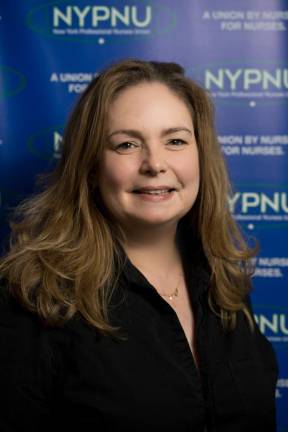Eileen Toback and the Future of the Union Movement
Collective organizing has run in Toback’s family for at least three generations. Now, she is taking up the fight to secure fair compensation for nurses and taking the helm of several national policy campaigns.

During the Great Depression, a line worker was thrown out of a pocketbook-making factory. With the support of Eileen Toback’s grandfather, the worker found representation in court by a lawyer. This is where Toback, the New York Professional Nurses Union (NYPNU) executive director, figures her unionizing roots were watered. According to her, the zeal runs in the family.
“Growing up, I understood the power the employers have over employees and how it affects the entire family,” said Toback, whose father worked for Consumer Reports Magazine, a publication of the Consumers Union advocacy organization. “I grew up thinking that I wanted to play some role in leveling the playing field and that workers deserve a voice in the job and deserve security.”
Toback graduated from Cornell University’s School of Industrial and Labor Relations. After a brief stint as a doctors’ counsel, 23-year-old Toback was hired by the NYPNU to serve as executive director. During her 16 non-consecutive years in this role, Toback designed and implemented strategic campaigns to negotiate collective bargaining agreements with healthcare employers for nurses, armed the organization with a robust political and communications staff, and formed affiliate partnerships with other unions across the country. She also helped prepare arbitration cases, maintaining a 90 percent win rate.
As the NYPNU prepares for a contract year back-and-forth, Toback said that the power to negotiate a favorable outcome and stave off threats of union-busting depends on constant, vigilant organizing. “In any given year, any given month, people have to work on the health of the union,” she said. “The leadership have to be engaged in educating the membership, and we have to stand with each other and decide how to fight for the things we need through a democratic process. Solidarity is not just a word, it’s a movement-building concept that we have to nurture relationships in big-and-small ways.”
In between and during her tours of duty at the helm of NYPNU, Toback worked in political and policy campaigns: serving as a delegate and committee member for the Working Families Party, developing plans to recruit and train activists with the American Civil Liberties Union, organizing for the Kerry/Edwards 2004 presidential campaign, and rallying opposition with various advocacy groups against the 2017 Tax Cuts and Jobs Act, which critics accused of feathering the nests of America’s wealthiest earners at the expense of working people.
Toback believes that a key part of the fight for workers is changing the legislative landscape to hold employers accountable for violating labor rights and allowing employees to organize without obstruction from anti-union laws or fear of blackballing. Although she recognizes that the American union movement has weakened in the last several decades in a country relatively inhospitable to union activity compared to other democracies, Toback sees the winds shifting amid rising worker consciousness.
“COVID has fundamentally changed people’s thoughts about their relationships to work. They’re tired of just not getting ahead, and they understand the sometimes life-and-death reasons for why you have to be in a union and work together on issues,” she said. “More and more people, now a majority of Americans, support unions, and a lot of this moment is about getting them involved.”